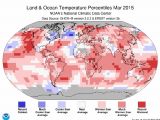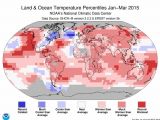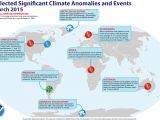In a new report released late last week, NOAA researchers show that this year's January-March period was the hottest ever documented, with each month setting new high-temperature records.
Yup, this year's January, February and March were all hotter than any other such month on record. Yet, some are still debating climate change and global warming.
Figures show global warming is happening
In their report, scientists with NOAA detail that, according to their measurements, Earth's average land and sea temperature this past March was one of 56.4 degrees Fahrenheit (13.6 degrees Celsius).
When compared to the average March temperature for the entire 20th century, this represents an increase of 1.5 degrees Fahrenheit (0.85 degrees Celsius), researchers explain.
“This marks the highest March temperature in the 136-year period of record, surpassing the previous record of 2010 by 0.09 degrees Fahrenheit [0.05 degrees Celsius],” the report reads.
In turn, the global average temperature documented for this year's January-March period was the absolute highest ever, surpassing the previous record of 2002 by 0.09 degrees Fahrenheit (0.05 degrees Celsius).
“The first quarter of 2015 was the warmest such period on record across the world's land and ocean surfaces, at 1.48 degrees Fahrenheit [0.82 degrees Celsius] above the 20th century average,” NOAA researchers say.
As illustrated in the map included in the gallery below, warmer than average temperatures for the January-March period were reported in most of Europe, South America, Asia, eastern Africa and western North America.
When it comes to the month of March alone, record warmth was documented in eastern Africa, various regions in Scandinavia, northwestern Russia, parts of China and northeastern Australia.
Judging by these temperatures, specialists argue that 2015 has high chances to become the hottest year ever documented since record keeping began 136 years ago.
Earth could get even hotter in the years to come
Scientists agree that it's man-made global warming that's driving this rapid increase in global average temperatures and warn that, under a business-as-usual-scenario, Earth will only get hotter in the years to come.
To limit global warming, efforts must be made to limit greenhouse gas emissions. As explained by specialists, this can be achieved by limiting investments in fossil fuels and spending heavily on green energy sources instead.

 14 DAY TRIAL //
14 DAY TRIAL // 


